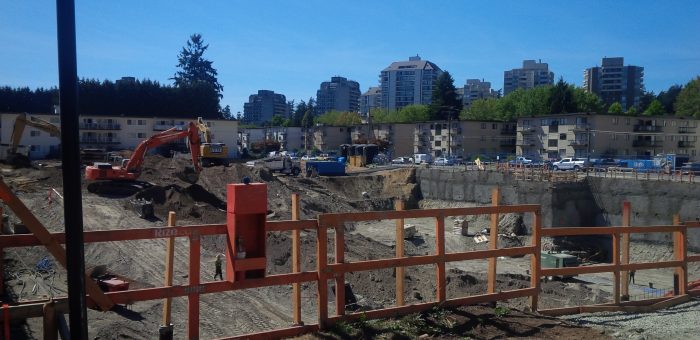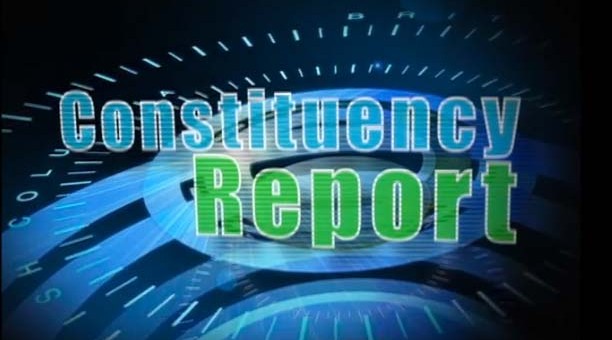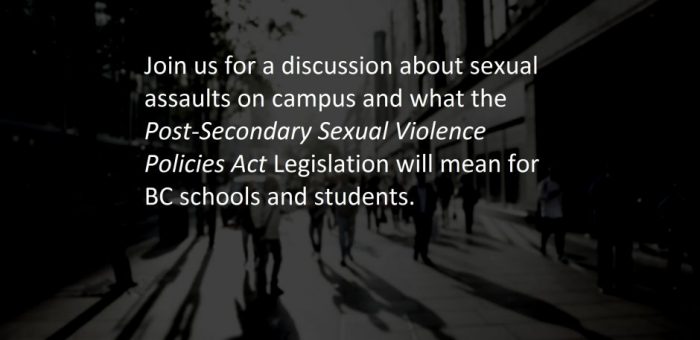Social Development
Kicking off the 2016 Mustard Seed Pie Off
 Today I had the honour of participating in the kick off to the 2016 Mustard Seed pie off challenge. The goal of their pie off campaign is to raise $100,000 and 100,000 lbs of food before October 31, 2016. Last year they raised $42,000 and 40,000 lbs of food in the 2015 pie off challenge.
Today I had the honour of participating in the kick off to the 2016 Mustard Seed pie off challenge. The goal of their pie off campaign is to raise $100,000 and 100,000 lbs of food before October 31, 2016. Last year they raised $42,000 and 40,000 lbs of food in the 2015 pie off challenge.
Mustard Seed has “been essential in fighting hunger and restoring faith to a large portion of people living in poverty, as well as the working poor, in greater Victoria since 1975″. And last year I rose in the Legislature to celebrate their more than 40 years of service to our community.
 Attending the pie off commencement with me was Del Manak, Acting Chief Constable of the Victoria Police Department. Now it’s not often that you get a chance to put a pie in the face of the Chief Constable of your local police force. So shortly after Chief Constable Manak challenged all the principals in Great Victoria schools to initiate their own pie off, I took great pleasure in assisting Del Manak in completing his challenge. But I should have been a little less exuberant. A few minutes later, Chief Constable Manak pied me.
Attending the pie off commencement with me was Del Manak, Acting Chief Constable of the Victoria Police Department. Now it’s not often that you get a chance to put a pie in the face of the Chief Constable of your local police force. So shortly after Chief Constable Manak challenged all the principals in Great Victoria schools to initiate their own pie off, I took great pleasure in assisting Del Manak in completing his challenge. But I should have been a little less exuberant. A few minutes later, Chief Constable Manak pied me.
Just prior to being pied, and unbeknownst to them, I challenged:
- Jamie Cassels, President of the University of Victoria
- Tony Joe, Realtor with RE/MAX Camosun – Oak Bay
- Lisa Helps, Mayor of the City of Victoria.
Finally, for those who might be wondering what the pie was made of, I am saddened to report that it wasn’t pie at all. But of course it wasn’t, Mustard Seed could not be seen to be wasting food. The pie was actually nothing more than lightly fragranced (for sensitive skin) Gillette foamy!
Video of Pie Off
The growing demoviction crisis in Burnaby – a path forward
Many might not be aware that an emerging, and entirely preventable, crisis in affordable rental accommodation is developing in the Burnaby Metrotown area. Perhaps the reason for this is that neither the government nor the official opposition has been raising this issue publicly. That’s one of the reasons why I accepted an invitation from the Metrotown Residents’ Association to tour the region on August 18th. While my visit to the area generated some excellent local media coverage in Burnaby Now and Vancouver 24 hours, I thought it was important for me to expand upon what I learned from my tour.
Background
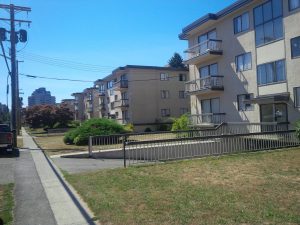 The issue that Burnaby is now facing has arisen from recent and imminent changes in policy. The first concerns legislative changes to the Strata Property Act that were passed in Bill 40, Natural Gas Development Statutes Amendment Act, 2015. An obvious question concerns why changes to the Strata Property Act were passed within a Natural Gas Development Statutes Amendment Act. There is, of course, no justifiable reason for this to have occurred. My own opinion is that it was done simply because Richard Coleman is the Minister of Natural Gas Development and also the Minister Responsible for Housing. By burying housing amendments in a natural gas bill the minister was able to deal with his entire portfolio at once. Bill 40 contained provisions that allowed Stratas to be dissolved (and hence the property sold) with only 80% instead of 100% of strata owners agreeing.
The issue that Burnaby is now facing has arisen from recent and imminent changes in policy. The first concerns legislative changes to the Strata Property Act that were passed in Bill 40, Natural Gas Development Statutes Amendment Act, 2015. An obvious question concerns why changes to the Strata Property Act were passed within a Natural Gas Development Statutes Amendment Act. There is, of course, no justifiable reason for this to have occurred. My own opinion is that it was done simply because Richard Coleman is the Minister of Natural Gas Development and also the Minister Responsible for Housing. By burying housing amendments in a natural gas bill the minister was able to deal with his entire portfolio at once. Bill 40 contained provisions that allowed Stratas to be dissolved (and hence the property sold) with only 80% instead of 100% of strata owners agreeing.
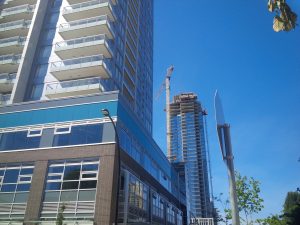 The second important policy change is that the municipality of Burnaby is moving towards rezoning low-rise areas to mid- and high-rise in and around the Metrotown skytrain station. While in and of itself this might sound like a fine idea — by increasing density you increase availability of housing stock — the reality is that it is compounding the affordability crisis in the area. Below I’ll attempt to outline why this is the case.
The second important policy change is that the municipality of Burnaby is moving towards rezoning low-rise areas to mid- and high-rise in and around the Metrotown skytrain station. While in and of itself this might sound like a fine idea — by increasing density you increase availability of housing stock — the reality is that it is compounding the affordability crisis in the area. Below I’ll attempt to outline why this is the case.
But first, I’d like to thank the Metrotown Residents’ Association for inviting me to participate on the tour. I’m also grateful to the residents of the Maywood, Marlborough and Cedar Place who took the time to speak with me.
The problem
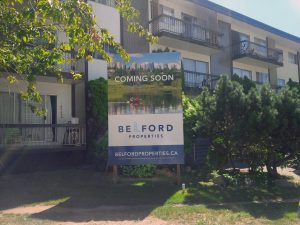 In recent years there has been a dramatic increase in the number of demolition permits that have been issued by the City of Burnaby. Older, low rise apartment buildings are being bought up at an alarming rate by developers whose intention is to demolish them and turn them into high end condominiums. Now in theory, as I note above this might sound like a great idea. The current stock of rental housing is dated and densification increases housing supply. But in reality, what is happening is that lower income rental housing is being replaced by higher income luxury condominiums. The result is that these lower income people are displaced and have nowhere to go. This is particularly troubling as Burnaby is ranked dead last in terms of affordability in the Canadian Rental Housing Index.
In recent years there has been a dramatic increase in the number of demolition permits that have been issued by the City of Burnaby. Older, low rise apartment buildings are being bought up at an alarming rate by developers whose intention is to demolish them and turn them into high end condominiums. Now in theory, as I note above this might sound like a great idea. The current stock of rental housing is dated and densification increases housing supply. But in reality, what is happening is that lower income rental housing is being replaced by higher income luxury condominiums. The result is that these lower income people are displaced and have nowhere to go. This is particularly troubling as Burnaby is ranked dead last in terms of affordability in the Canadian Rental Housing Index.
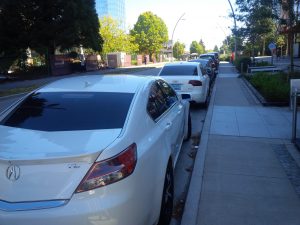 Metrotown mall and the Metrotown skytrain station are immediately adjacent to the neighbourhoods that are being affected. The proximity of rapid transit is particularly important to the residents living in the area who rely on it to get to their employment. At the same time, it was evident that the residents moving into the newer high-end condominiums are far more affluent. One can readily see this simply by looking at the cars parked along the residential streets immediately in front of the new constructions as opposed to the older ones.
Metrotown mall and the Metrotown skytrain station are immediately adjacent to the neighbourhoods that are being affected. The proximity of rapid transit is particularly important to the residents living in the area who rely on it to get to their employment. At the same time, it was evident that the residents moving into the newer high-end condominiums are far more affluent. One can readily see this simply by looking at the cars parked along the residential streets immediately in front of the new constructions as opposed to the older ones.
The response by Burnaby’s Mayor has been to blame the provincial and federal government for the problem. I find this odd in that zoning falls squarely within municipal jurisdiction and that municipalities have the power to create standards of maintenance bylaws which can incentivize upkeep of existing stock. They also have wide discretion as to how they use funds acquired from developers through the granting of increased density. Of course, the development of affordable rental housing, like Cedar Place in Burnaby, often requires the investment of resources from multiple levels of government, but it’s simply not good enough to pass the blame to someone else.
 Residents in the area that I talked to spoke of the constant stress that they are living with as they wonder if their apartment building will be next. They have tried to organize and meet regularly. Unfortunately, several of them told me that whenever they put up posters advertising their next gathering, the posters are quickly blacked out, like the example shown to the right.
Residents in the area that I talked to spoke of the constant stress that they are living with as they wonder if their apartment building will be next. They have tried to organize and meet regularly. Unfortunately, several of them told me that whenever they put up posters advertising their next gathering, the posters are quickly blacked out, like the example shown to the right.
So what is being done for those being evicted. The honest answer is that virtually nothing is being done. Burnaby council seems to be turning a blind eye as the demoviction problem gets out of hand. Rather than recognizing that the municipality has a moral obligation to look out for the best interests of their constituents, they seem content with the knowledge that property taxes and developer funds acquired through granting increased density will increase the City’s coffers. In fact, Burnaby’s Mayor has been reported to have said “he’s not about to give in to downloading what he says are provincial and federal responsibilities.”
The solutions
Burnaby council doesn’t have to look far to get a sense of what they might do. Under the leadership of Gregor Robertson the City of Vancouver has taken numerous steps to incentivize the development of rental houses. At the same time they successfully petitioned the provincial government to bring in enabling legislation that would allow Vancouver to introduce a vacancy tax that would penalize those purely speculating in the marketplace.
Burnaby did not. In fact, I wrote to Burnaby Mayor and Council in May asking them for their views on the vacancy tax. As I have written about earlier, the addition of the vacancy tax only into the Vancouver Charter and not the Community Charter as well (which other communities like Victoria and Oak Bay have been calling for) makes no sense at all. For example, on one side of Boundary Road (in Vancouver) a vacancy tax could be applied; on the other side of the street (in Burnaby), it would not. I never received a response or even an acknowledgement that my letter was received. In addition, Burnaby has the jurisdictional ability to slow the pace of demovictions to ensure that the construction of affordable, rental accommodation keeps pace with the increased densification.
Unlike the more progressive housing approach of Vancouver, Burnaby’s response to the affordability crisis has been to call on the BC government to allow municipalities to introduce “rental-only” zoning. The BC NDP have also been musing over the possibility of introducing legislation that would allow rental-only zoning options for municipalities. In my view this is not a solution. In fact, I would argue that this has the potential of being disastrous as it would potentially lead to the development of big city ghettos as found in other jurisdictions world wide.
Constituency Report – April 2016
Constituency Report is a public service that Shaw TV graciously offers MLAs. This month’s video is provided below.
Judy Fainstein and I once more tried something different. The first segment follows the usual discussion of legislative issues relevant to Oak Bay-Gordon Head and British Columbia in general. In the second segment, I introduce Isobel Mackenzie, British Columbia’s Seniors Advocate. We discuss the role and services offered by the Office of the Seniors Advocate British Columbia.
As always, I’d be interested in your feedback on this constituency report.
Constituency Report
MLA Town Hall: Sexual Violence on BC Campuses
MLA Town Hall: Sexual Violence on BC Campuses
On Wednesday, May 4th 2016 we will be hosting an MLA Town Hall on sexualized violence on BC campuses with a panel of frontline speakers and experts. The event will start with a talk from MLA Andrew Weaver about his legislative efforts to address this issue, as well as an update on the progress of his bill, the Post-Secondary Sexual Violence Policies Act. Following Dr. Weaver, each panelist will speak about their connection to the issue as well as their ongoing efforts to prevent and address instances of sexual assault.
Panelist will include:
- The Victoria Sexual Assault Centre
- The UVic Student Society
- Trauma Therapist Barbara Allyn
- TRU Student Jean Strong
Plenty of time will be reserved for questions, comments, and discussion about how we can tackle this incredibly important issue and what the legislation will mean for BC post-secondary schools and students. This is a topic that effects everyone in our community, and everyone is welcome to attend.
The event will take place from 7:00pm to 9:00pm at the University of Victoria, Student Union Building (3800 Finnerty Road), in the Vertigo Room. Doors will open at 6:30pm and seating will be on a first-come, first-serve basis.
Please feel free to circulate this invitation to other people or groups who may also have an interest in joining us. And for more information, don’t hesitate to contact our office by email: andrew.weaver.mla@leg.bc.ca by phone: 250 – 472 – 8528 or on facebook.
Should we Lower the Voting Age to 16? What do you think?
Background
One of the fundamental issues that motivated me to get into politics was that in my view, far too many of our political leaders are shortsighted in their decision-making. That is, too often political opportunism and the quest for re-election are the determining factors and primary motivators in a prevailing short-sighted and short-term political agenda. But that does not serve society well in the long run.
Let me give you three concrete examples.
- Recently, our premier suggested that the solution to the underfunding of public education lay with growing the economy. Fundamentally the B.C. Liberals have it backwards. A quality education is not the luxury of a strong economy. A quality public-education system is what builds a strong economy. Our society has thrived through innovation precisely because of the emphasis we have placed on education. The doctors, engineers, nurses and skilled labour of tomorrow — those who will take care of us as we age — are in the school system today. Surely it’s in all of our long term interests to ensure substantive short term investment in the society of tomorrow.
 We’ve all heard of the Dr. Suess book The Lorax, in which the Once-ler destroys the Truffula forest in a short-sighted quest to produce Thneed garments (“A-fine-something-that-all-people need”). In the end, with the forest gone, the Once-ler’s wealth and prosperity collapses and he lives a depressed life of solitude. The Lorax, published in 1971, beautifully articulates the result of short-sighted and unsustainable resource management. A Loraxian approach to resource management does not protect our renewable resources, natural environment or build public support. Yet this is the approach we are far too often taking in British Columbia, or frankly more broadly in Canada as a whole. It’s a bit like being given a great big inheritance, using that inheritance to throw a huge party, and then waking up the next day broke, with a wicked hangover and asking oneself “Now What?”.
We’ve all heard of the Dr. Suess book The Lorax, in which the Once-ler destroys the Truffula forest in a short-sighted quest to produce Thneed garments (“A-fine-something-that-all-people need”). In the end, with the forest gone, the Once-ler’s wealth and prosperity collapses and he lives a depressed life of solitude. The Lorax, published in 1971, beautifully articulates the result of short-sighted and unsustainable resource management. A Loraxian approach to resource management does not protect our renewable resources, natural environment or build public support. Yet this is the approach we are far too often taking in British Columbia, or frankly more broadly in Canada as a whole. It’s a bit like being given a great big inheritance, using that inheritance to throw a huge party, and then waking up the next day broke, with a wicked hangover and asking oneself “Now What?”.- Right now, it is in every person, in every household, in every municipality, in every city, in every province, in every country in the world’s best interest to do precisely nothing about global warming from a traditional cost-benefit point of view. That is because the costs of action are borne by the individual and the costs of inaction are distributed over 7 billion people in the next generation. Global warming is literally a textbook example of the Tragedy of the Commons with the atmosphere being the shared natural resource.The decisions we make today as to whether or not we put an increasing price on emissions will have profound consequences on the climate, natural and built environment, biodiversity and availability of water over the next century. Yet those making the decisions today will not have to live the consequences of the decisions they are making.
To summarize, most of the grand challenges of our time require decision-makers to look beyond the next election cycle and instead reflect upon the long-term consequences of their decisions. Dealing with poverty, homelessness and the increasing income disparity between the wealthy and the poor, or sustainable resource development, global warming and other environmental issues, or envisioning ways and means of moving towards more steady-state, diversified economies that aren’t subject to wild boom and bust cycles all require us to reflect upon the importance of intergenerational equity. This leads me to pose the following question:
Should the present generation also consider future generations in
the fiscal, social and environmental decisions we make?
I happen to think we do.
Yet herein lies the fundamental problem. Today’s decision-makers don’t have to live the long-term consequences of the decisions they make and those who do are either not allowed to, or are not participating in, our democratic institutions.
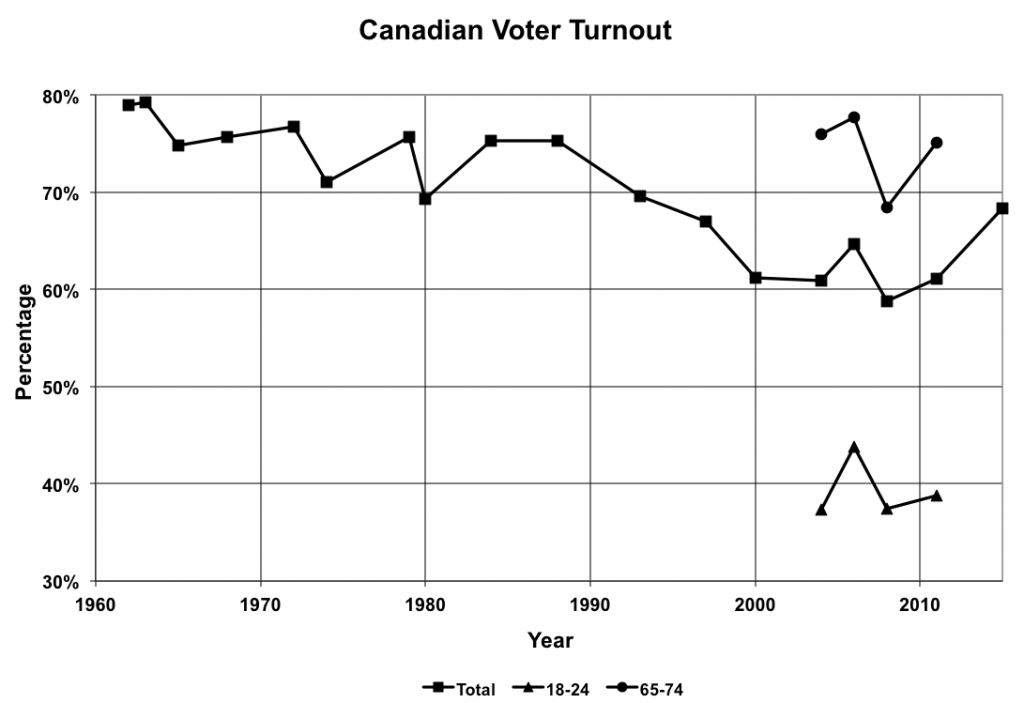 As shown in the figure above, upwards of 70% of seniors over the age of 65 have voted in our recent federal elections. Only around 40% of youth between the ages of 18-24 voted (age-related demographic data likely won’t be available until May for the 2015 federal election). Is it any surprise that many of our political leaders target their promises and messaging to a demographic that they know will vote. I’d wager that when the results become available, we’ll see that the youth participation rose in the 2015 election as it was clear that Prime Minister Trudeau and his Liberal team were discussing values that mattered to the youth of today.
As shown in the figure above, upwards of 70% of seniors over the age of 65 have voted in our recent federal elections. Only around 40% of youth between the ages of 18-24 voted (age-related demographic data likely won’t be available until May for the 2015 federal election). Is it any surprise that many of our political leaders target their promises and messaging to a demographic that they know will vote. I’d wager that when the results become available, we’ll see that the youth participation rose in the 2015 election as it was clear that Prime Minister Trudeau and his Liberal team were discussing values that mattered to the youth of today.
Voting Age History
The voting age was not always 18 in British Columbia and Canada. In fact, it wasn’t until 1970 that the Canada Elections Act was amended to drop the voting age from 21 to 18. In British Columbia we made the jump in two steps. First, in 1952 we dropped the voting age from 21 to 19, but it wasn’t until 1992 that we made the subsequent change to lower the age to 18.
 Around the world more and more jurisdictions are openly discussing the notion of dropping the voting age to 16. In fact, a growing number have actually done so. The most recent and notable example of this occurred in Scotland.
Around the world more and more jurisdictions are openly discussing the notion of dropping the voting age to 16. In fact, a growing number have actually done so. The most recent and notable example of this occurred in Scotland.
Scotland experimented by lowering the voting age in their September 18, 2014 independence referendum. They viewed it as being so successful that they subsequently permanently dropped the voting age to 16 in all future Scottish Parliament and local government elections.
The voting age in Brazil has been 16 since 1988; Austria changed its voting age to 16 in 2007; Argentina dropped the voting age to 16 in 2012. These are but a few of the growing number of jurisdictions that are either considering or already have dropped the voting age to 16 around the world.
The Justification
As I noted above, there has been a disturbing trend of low youth voter turnout in Canadian elections. The non-profit US-based NGO Fair Vote has noted that there is empirical evidence to suggest that “the earlier in life a voter casts their first ballot, the more likely they are to develop voting as a habit.” So while youth turnout might remain low, there is evidence to suggest that there will be increased participation. What’s more, each and every student in the province of British Columbia is required to take Social Studies 11 (or Civic Studies 11 or BC First Nation Studies 12) to fulfill their Social Studies graduation requirement. Unit 1 of the four-unit Social Studies curriculum in the 2005 Integrated Resource package is Politics and Government. While not yet finalized, Politics and Government remains as Unit 1 in the draft 2015 Integrated Resource package.
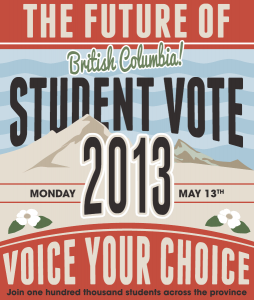 Social Studies 11 is a class taken when students are typically sixteen years old. It is an ideal time to engage students on the history and importance of voting. And this sort of experiential learning, wherein direct experience is inserted into the learning environment, has a rich history of validation since the early work of John Dewey in the 1930s. So giving students the ability to vote at the time they are learning about its importance, and knowing that the earlier a voter casts a first ballot, the more likely they are to be lifelong voter, almost certainly will lead to greater voter participation.
Social Studies 11 is a class taken when students are typically sixteen years old. It is an ideal time to engage students on the history and importance of voting. And this sort of experiential learning, wherein direct experience is inserted into the learning environment, has a rich history of validation since the early work of John Dewey in the 1930s. So giving students the ability to vote at the time they are learning about its importance, and knowing that the earlier a voter casts a first ballot, the more likely they are to be lifelong voter, almost certainly will lead to greater voter participation.
As I noted earlier, today’s decision-makers don’t have to live the long-term consequences of the decisions they make and those who do are either not allowed to or are not participating in our democratic institutions. We can do something about the former by reducing the voter age to 16. After all, the youth of day are the leaders of tomorrow and they should have a say in the direction we are heading as they will inherit what we leave them in the years ahead.
Having spent many years as an educator and having presented to, or engaged in discussions with, high school students and classes across British Columbia on numerous occasions, I find it difficult to accept an argument that students are not mature enough of informed enough at age 16 to vote. Students today have access to information like never before; they are tech savvy and they know where to go to get information if they need it.
And of course, there are numerous other arguments, one of the strongest of which is that many youth work and so pay taxes. Taxation without representation is generally counter to our democratic principles. That is, youth must pay the taxes but they are not allowed to vote for those who put in place laws that create them. Other compelling reasons include the fact that we already trust youth to drive at 16, they can get married at 16 (with parents’ permission) and you can drop out of school at 16. These are all pretty major life responsibilities that are entrusted upon our youth.
What do you think?
So tell me what you think? Should we lower the voter age to 16 in the province of British Columbia? There is a trend happening worldwide in the area. Should we lead the way or not? And if not, why not? If so, why?



